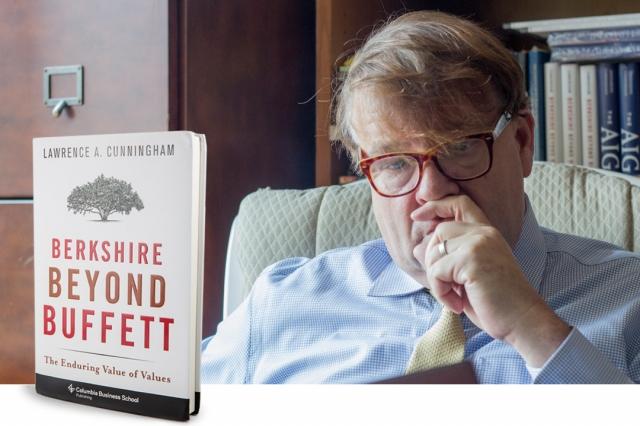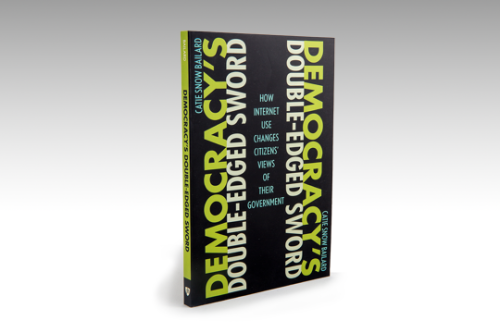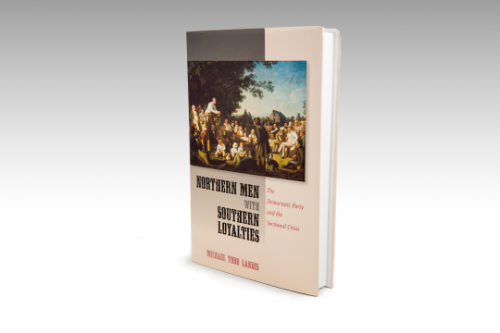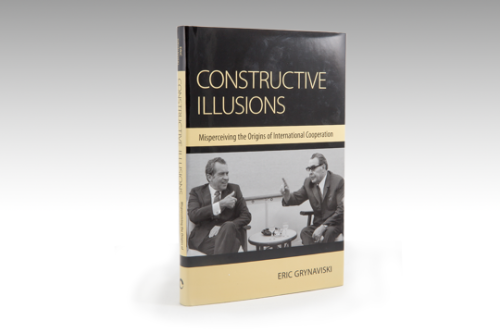The Mega-Corporation Next Door
Law professor Lawrence A. Cunningham (Photo: Zach Marin, CCAS ’18; books jacket photos: William Atkins)
The Mega-Corporation Next Door
GW Law professor Lawrence A. Cunningham has gotten to know Warren Buffett’s $350 billion company, Berkshire Hathaway, a colossus that manages to feel like a small business, he writes.
By Menachem Wecker, MA ’09
Since this book was published in October, Warren Buffett’s behemoth conglomerate, Berkshire Hathaway Inc., has hardly sat still. It used its Procter & Gamble stock to buy Duracell; it acquired the car dealership Van Tuyl Group, whose previous year boasted about $8 billion in sales; and Heinz, which it partially owns, merged with Kraft. But that’s all par for its course. So, too, is Berkshire’s ability to absorb that change without rocking the culture at its core, says Lawrence A. Cunningham, the Henry St. George Tucker III Research Professor of Law.
“The good news,” he says of all that activity, “is that it may warrant an updated edition in coming years.”
Mr. Cunningham met Mr. Buffett in 1995, when the renowned investor and Presidential Medal of Freedom awardee attended a symposium about his letters to shareholders, which Mr. Cunningham hosted. The professor later published the letters in a book, which he sold at Berkshire’s annual meetings and, over time, got to know Mr. Buffett and other personnel.
“Those relationships provided significant, valuable information and insight unavailable anywhere else,” he says.
Those ties didn’t lead Mr. Cunningham, who is also a Berkshire investor, to avoid controversy. He concedes, though, that he generally prefers to write about positive things. “I have found it is much more fun to write about Berkshire Hathaway than Enron,” he says.
The culture and philosophy he explores in the book are an anomaly among large U.S. corporations, he says. “It is more like what is found in smaller business partnerships. Berkshire shareholders think of themselves as owners or partners, while managers see their role as stewards,” he says.
“Throughout the organization, overhead is kept low, loyalty is prized, individual autonomy promoted, entrepreneurship stimulated and capital allocated shrewdly.”
And where others buy companies to retool and offload them, Berkshire hangs on. Whether its business model works is plainly clear, but Mr. Cunningham sets out to unravel how the model works and whether Berkshire could continue without the man who built it.
Democracy’s Double-Edged Sword: How Internet Use Changes Citizens’ Views of Their Government (Johns Hopkins University Press, 2014)
Catie Snow Bailard
The sort of attention that has addressed how the Internet facilitates political protests hasn’t focused on the extent to which the web makes its users want to act politically to begin with, writes Dr. Bailard, an assistant professor of media and public affairs. After analyzing the Internet’s “mirror-holding” and “window-opening” properties, she writes that the web “meaningfully alters not only the quality and range of information but also the criteria through which individuals evaluate their governments.”
Northern Men With Southern Loyalties: The Democratic Party and the Sectional Crisis (Cornell University Press, 2014)
Michael Todd Landis, PhD ’11
It simply won’t do any longer to think of the Civil War in terms of a clean break between the North and the South over slavery, writes Dr. Landis, an assistant history professor at Tarleton State University in Texas. Among the Northern Democratic leadership in the 1850s were “doughfaces,” who at once sought to please the party’s Southern bosses and to purge its ranks of anti-slavery members. They were, Dr. Landis observes, “anti-democratic to the core.”
Back Channel to Cuba: The Hidden History of Negotiations Between Washington and Havana
William M. LeoGrande and Peter Kornbluh
The recent warming of U.S.-Cuba relations may seem like a complete policy reversal, but “every president since Eisenhower has engaged in some form of dialogue with Castro and his representatives,” write Dr. LeoGrande and Mr. Kornbluh, a senior analyst at GW’s National Security Archive. One hushed meeting between Washington and Havana even took place on the steps of the Lincoln Memorial, they write in their book, which draws upon a trove of declassified documents.
(University of North Carolina Press, 2015)
The Cruiser: A Dan Lenson Novel
David Poyer, MA ’86
In this novel, the 14th in a series that follows fictional GW alumnus and Naval Capt. Dan Lenson, real GW alumnus and retired Naval officer Mr. Poyer sends the hero on a clean-up mission after a warship with some valuable—and highly classified—cargo runs aground off the Italian coast.
(St. Martin’s Press, 2014)
Constructive Illusions: Misperceiving the Origins of International Cooperation
Eric Grynaviski
Challenging the idea that diplomacy might be best when parties truly understand one another, Dr. Grynaviski, an assistant professor of political science and international affairs, writes that cooperation often is likeliest when nations erroneously feel they have much in common.
(Cornell University Press, 2014)
Narcissism and Politics: Dreams of Glory
Jerrold M. Post
Narcissus, of Greek mythological notoriety for falling fatally in love with his own reflection, epitomizes the Facebook-addicted “me generation.” The “apparent epidemic of narcissism” doesn’t infect all politicians, writes Dr. Post, GW professor of political psychology, but the “arena of public service and its limelight is particularly attractive, indeed irresistible, to individuals with narcissistic propensities.”
(Cambridge University Press, 2015)
Other Summer News
Alumni News
A pair of politicos reconnect on the air, Eric Cantor appears at GW's Wall Street Symposium and more.
George Welcomes
Laverne Cox, Rick Santorum, five top CEOs and more.
One for the Birds
It was a surprise to find four graduation hoods and a spiffy Stetson top hat in a box described as "cap and gown of Frank Alexander Wetmore."
5 Questions on Slam Poetry
Elizabeth Acevedo, BA '10, one of the 2014 National Poetry Slam champions, mixes poetry and performance to explore life and identity as a Dominican woman and first-generation American.
Create Your Own Poetry
Poetry can be anything. An exhibit at GW's Brady Gallery had visitors create "found poems" by redacting, reordering, refashioning or colorizing a canvas of words made from a few pages of Oscar Wilde's The Picture of Dorian Gray.
Stitch by Stitch
Aspiring costume makers in the Department of Theatre and Dance sketch, stitch and style in GW's costume shop.
Square Dancing With a 3-D Printer
When the Corcoran School of the Arts and Design unveiled its end-of-the-year thesis exhibition this spring, a group of little plastic dragons celebrated the opening with more revelry than anyone in the gallery.














